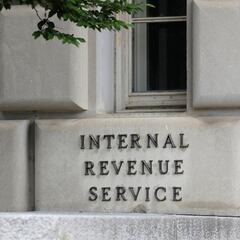Tax Day on Monday, 17 May: how much do you pay if you don’t file taxes on time?
The IRS has extended the tax return deadline by a month, but failure to complete your filing by Monday could see you face various financial penalties.


The deadline to submit your tax returns for 2020 is drawing near but you still have time to get your financial affairs in order and complete the filing.
Earlier this year the IRS extended the deadline to Monday 17 May for individual filers, to allow Americans more time in light of the pandemic. However failure to meet the new deadline could leave you facing significant financial penalties.
“It is imperative for anybody who thinks they will owe to make sure that they get that tax return in or that they file an extension and it’s accepted by the IRS and that they do that by the filing deadline,” Rebecca Thompson, director of the Taxpayer Opportunity Network, told CNBC. “If not, they will get hit with penalties for failing to file and failing to pay.”
Read more:
- IRS will start sending tax refunds for the $10,200 unemployment tax break
- Fourteen states will end additional unemployment benefits in June
How much is the fine for filing a late tax return?
There is no flat amount that you will be charged by the IRS if you do not submit your tax returns before the deadline, and the amount will grow over time if you do not act quickly. The tax authority will fine late filers 5% of their unpaid tax required to be reported for each month that the return is not submitted. This is capped at 25% of the original amount.
The deadline to file taxes is this upcoming Monday — but you can still file for an extension. Here’s how pic.twitter.com/WTffyPFpnH
— CBS News (@CBSNews) May 15, 2021
If it transpires that you owe the IRS additional tax payments, you will be hit with another charge for failing to pay the tax reported on your returns. This penalty is charged at 0.5% of the total amount that you owe, and is again capped at a maximum of 25%.
It should be noted that these penalties also accrue interest, which will not stop until you have paid your outstanding tax balance in full.
Other fines for tax-related offences
While it is important that you meet the 17 May deadline to avoid being hit with various penalties, you can also be fined for other misdemeanours in relation to your filing.
Related stories
If you try to pay your tax balance using a form of payment that is rejected by you bank (such as a dishonoured check) you will be fined 2% of the amount for payments of $1,250 or more, or a flat $25 if it is less. Is your tax balance is less than $25, then you will be charged the original amount as a fine.
The IRS tax deadline is less than a week away. With stimulus checks, unemployment and work-from-home, taxes this year are likely more confusing. @SRuhle shares expert tips for those who still need to file. https://t.co/WUUqnXbRjM
— NBC Nightly News with Lester Holt (@NBCNightlyNews) May 12, 2021
For those who are required to make estimated tax payments, failure to pay the correct amount on time will also result in a fine. Because these payments are part of a number of instalments, the IRS will calculate a penalty based on your annual income and in relation to whatever payments you have made previously.

